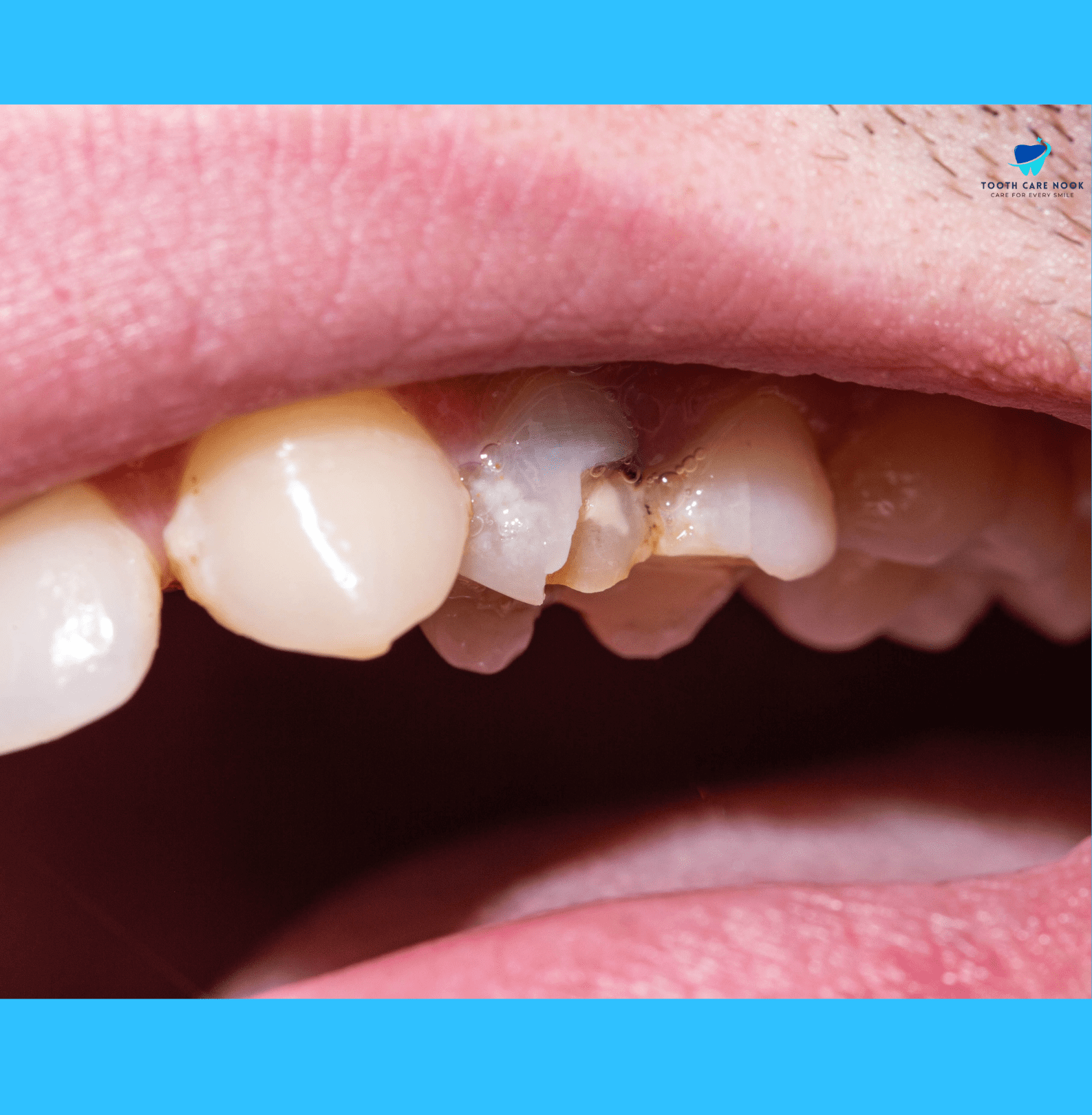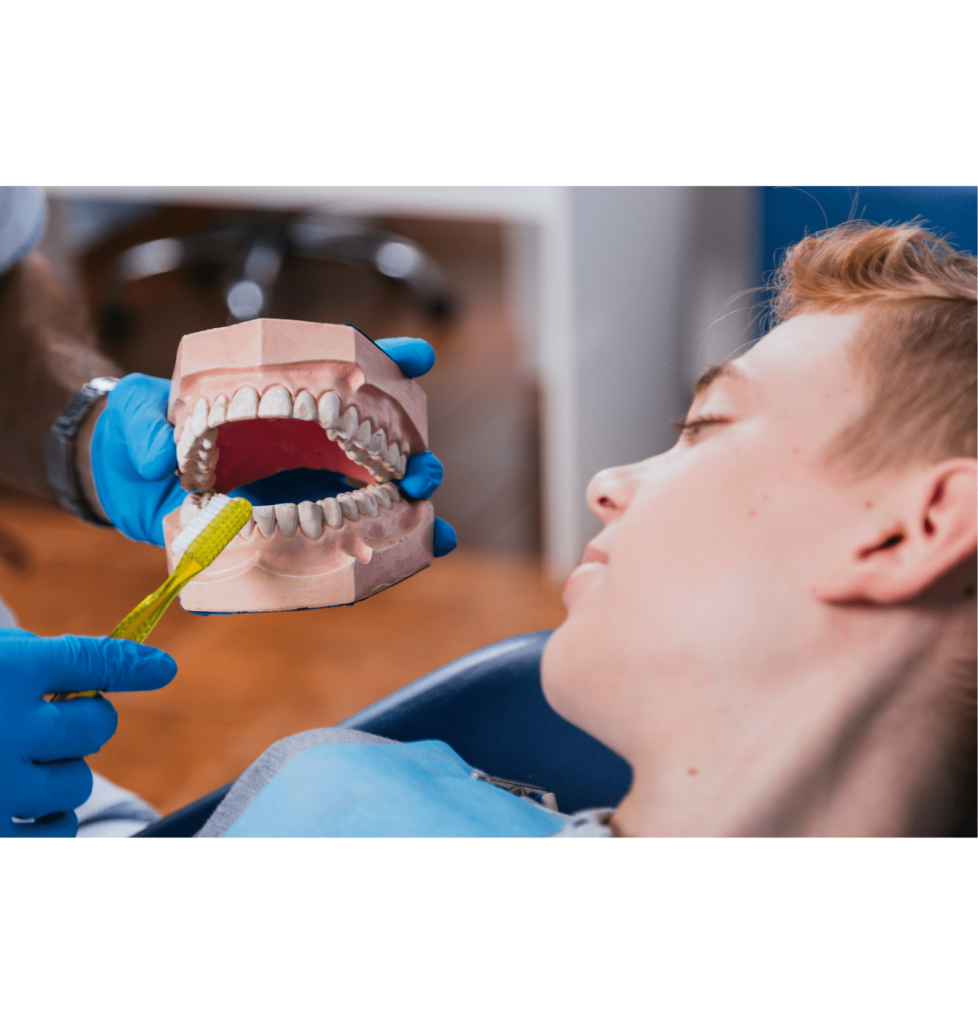How to Clean Dental Crowns?
Here’s a step-by-step process for cleaning dental crowns effectively:
Brush Gently and Thoroughly
Brush your dental bridges with teeth with a soft-bristled toothbrush and fluoride toothpaste at least two times a day. Hold the toothbrush at a 45-degree angle to the gum line and use gentle, circular motions to clean all surfaces of the teeth and bridge.
Pay special attention to the areas around the bridge and underneath the pontic. Make sure to brush gently yet thoroughly to remove plaque and food particles.
Use Water Flossers
Water flossers are particularly useful for cleaning dental bridges. Fill the reservoir with lukewarm water and aim the tip at the space between the pontic and adjacent teeth. Turn on the device and move the tip along the gumline to dislodge plaque and food particles.
Adjust the pressure settings as needed for comfort and effectiveness. Gently slide the floss between your teeth and move it up and down to remove any debris. Be careful not to pull too hard to avoid dislodging the crown. Floss at least once per day.
Use Interdental Brushes or Floss Threaders
If you have difficulty using traditional floss instead use interdental brushes or floss threaders to clean around the edges of the crown and under the gumline.
Rinse with Mouthwash
Rinse with an antimicrobial mouthwash to help reduce bacteria and plaque buildup around the crown. Choose a mouthwash suggested by your dentist and follow the instructions on the label.
What are the Issues and Problems Dental Crowns May Face?
Crowns can encounter the following issues and problems over time.
Decay
While dental crowns cover and protect the underlying tooth structure, the area where the crown meets the tooth can still be vulnerable to decay. Poor oral hygiene, inadequate brushing or flossing around the crown, and a high-sugar diet can contribute to decay around the crown margins.
Fractures or Chips
Dental crowns can chip or fracture especially if subjected to excessive force or trauma. This can occur due to habits like teeth grinding, biting hard objects, or accidents.
Tooth Crown Smell
Tooth crown smell can occur due to inadequate oral hygiene, bacterial accumulation around the crown margins, and issues such as decay or infection. The bacteria around the crown can produce dental crown odor which results in a foul smell. Poor oral hygiene practices, such as insufficient brushing and flossing, can exacerbate this issue.
Loose or Dislodged Crowns
Dental crowns may become loose or dislodged due to factors such as inadequate bonding, trauma, or changes in the underlying tooth structure. This can lead to discomfort, difficulty in chewing, and increased risk of further damage to the tooth.
Allergic Reactions
Some individuals may experience allergic reactions to the materials used in dental crowns such as metal alloys or porcelain but it’s rare. This can manifest as gum inflammation, discomfort, or other oral symptoms.
Gum Recession
In some cases, gum tissue around the dental crown may recede over time. They can expose the margin of the crown and potentially lead to aesthetic concerns, tooth sensitivity, or an increased risk of decay.
Infection or Abscess
If bacteria penetrate the area around the dental crown, it can lead to infection or abscess formation. Symptoms may include swelling, pain, sensitivity to temperature, or a foul taste or odor in the mouth.

Can Tooth Crown Cleaning be Done at Home?
Yes, tooth crown cleaning can be done at home as part of a regular oral hygiene routine. It’s essential to do it carefully to avoid damage to the crown or any other oral health issues.
Cleaning dental crowns at home is possible and recommended to maintain good oral hygiene and prolong the lifespan of the crown. If you face any issues with cleaning your dental crown at home must consult your dentist for guidance.
What Happens if You Delay Cleaning Dental Crowns
Delaying the cleaning of dental crowns can lead to the following oral health issues and complications:
- Plaque and tartar can accumulate around the crown margins and on the adjacent teeth. This buildup provides an ideal environment for bacteria to thrive which increases the risk of tooth decay and gum disease.
- Failure to clean dental crowns can result in gingivitis. If left untreated, gingivitis can progress to periodontitis which can lead to tooth loss and other systemic health issues.
- Due to the presence of plaque and bacteria around dental crowns, you can get bad breath. It can be embarrassing and indicative of poor oral hygiene. Regular cleaning of porcelain crowns helps remove bacteria and odorous substances and get rid of bad breath from crowns
- If you delay cleaning dental crowns, it can detract from their appearance which causes discoloration or staining. This can affect the overall esthetics of your smile and will require professional cleaning or polishing to restore the crown’s appearance.

